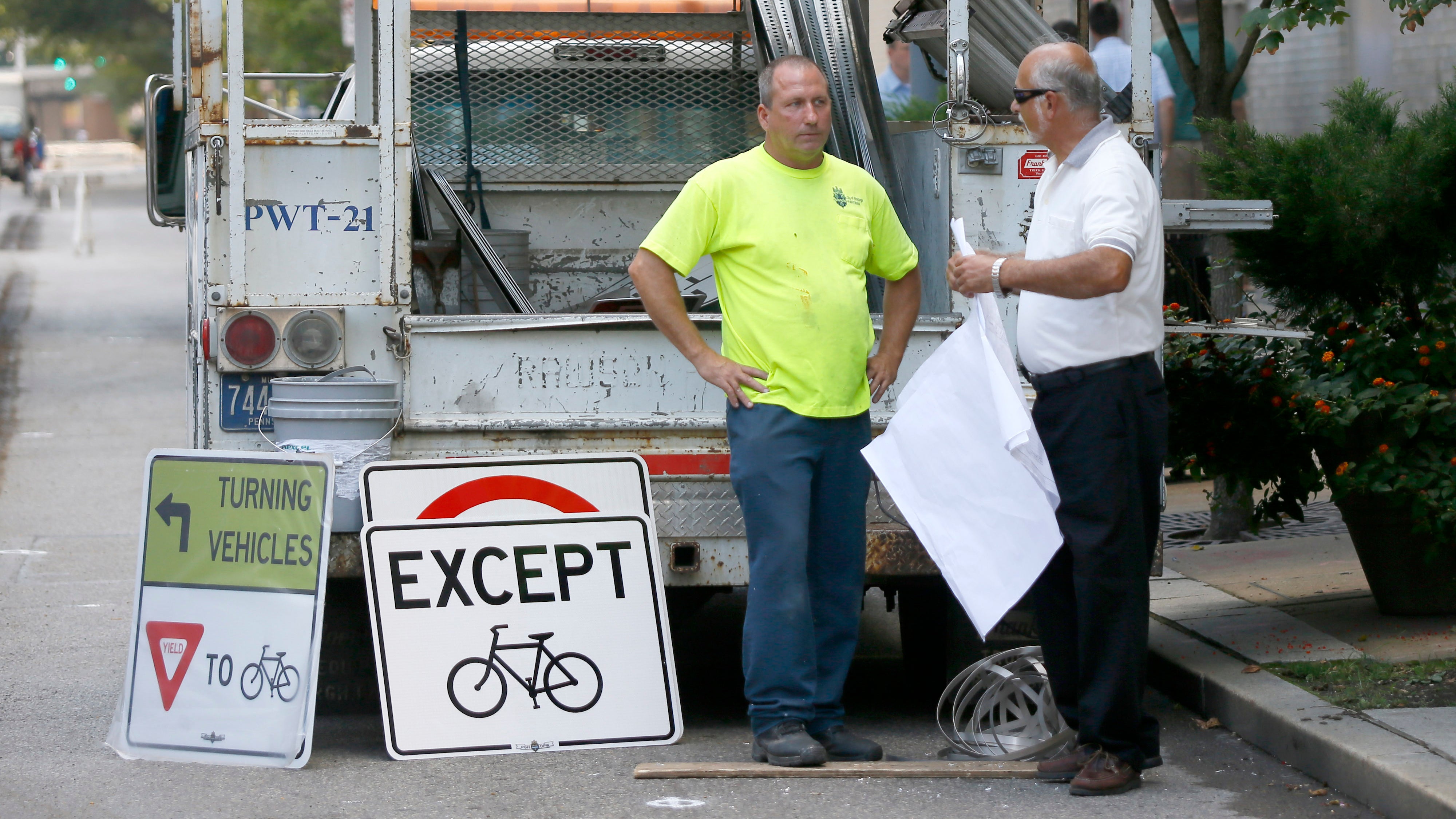To design great cities, think ambitiously, says one urbanist

Public works employees prepare to change signs along the eastbound lane of Penn Ave. in downtown Pittsburgh, Pa. on Wednesday, Sept. 3, 2014. City officials closed the eastbound lane from 6th Street in downtown to 16th Street in the city's Strip District to motor vehicles and made it a protected bicycle lane. (AP Photo/Keith Srakocic)
Urbanist Gil Penalosa says a city is only great when it’s safe to use for both 8 and 80 year old people.
Gil Penalosa evaluates intersections, neighborhoods, and whole cities by asking one question: can an 8-year-old and an 80-year-old go for a walk here and feel safe? If the answer is “no,” there’s work to do.
Penalosa is the founder and chair of a Toronto-based non-profit called 8-80 Cities, which advocates for urban biking, walking, parks, trails, and public spaces. He sees the walkability of a city as intimately tied to public health, sustainability, economic development, quality of life, and just about every other measure of urban vitality.
Penalosa was in Pittsburgh to speak at the American Planning Association of Pennsylvania’s annual conference. But he also spoke to a more intimate gathering of city leaders, planners, and activists at the WESA studio.
His remarks about Pittsburgh were brief and direct. The city, he said, needs to be more ambitious with its urban planning and has to develop a greater sense of urgency. “I think you need to realize you are far from great,” he told the audience.
His advice applies far beyond Pittsburgh.
For example, many cities have started making room for bike lanes on their streets. But, Penalosa said, without also slowing down traffic and establishing a minimum grid of bike lanes, the effort is a wasted one. “When people ask what’s first the chicken or the egg, it’s very clear what is first,” he said. “First we need to [build] good transit infrastructure and then people are going to use it.”
Penalosa insisted that pushing for more ambitious projects — like a whole bike grid instead of a coupe of bike lanes — was ultimately a political issue, not a technical or fiscal one. He urged political leaders to have courage. But also, to actively and sincerely engage citizens in the planning process. Perfunctory meetings where affected citizens may not actually be represented are not enough, he said. “You really have to decide whether this is tokenism or whether it’s honestly listening to the people,” Penalosa said.
Many of the questions from the audience focused on inequality in Pittsburgh and ways to bring the concept of 8-80 Cities to all neighborhoods, including poor, vulnerable ones. For Penalosa, distribution of amenities is an integral part of a successful city. He wants every child in the nation to be able to walk to a public park from his or her house, for example.
Asked how to prevent skyrocketing property values and potential resident displacement in the wake of improvements to public spaces in a neighborhood, Penalosa called displacement an indication of a larger problem. “When you improve a public space, if the value of those homes increases tremendously, usually it’s a symptom that that’s a pretty lousy city,” he said. “Because then that means that that is one of the few places that has nice public space, and the rest of the places do not have a good public space.” If every neighborhood had decent public spaces, improvement in one area would not set off huge property value shifts, he said.
He also spoke of democratic spaces that bring together and equalize different people, and the importance of managing public spaces in a way that encourages interaction.
Penalosa said there are no viable excuses for not planning a more pedestrian friendly city, even in a place like Pittsburgh where geography and weather are often tossed out as challenges. “Climate is such an excuse,” he chided the audience.
Get some warm clothes, he said, and get to work.
WHYY is your source for fact-based, in-depth journalism and information. As a nonprofit organization, we rely on financial support from readers like you. Please give today.


